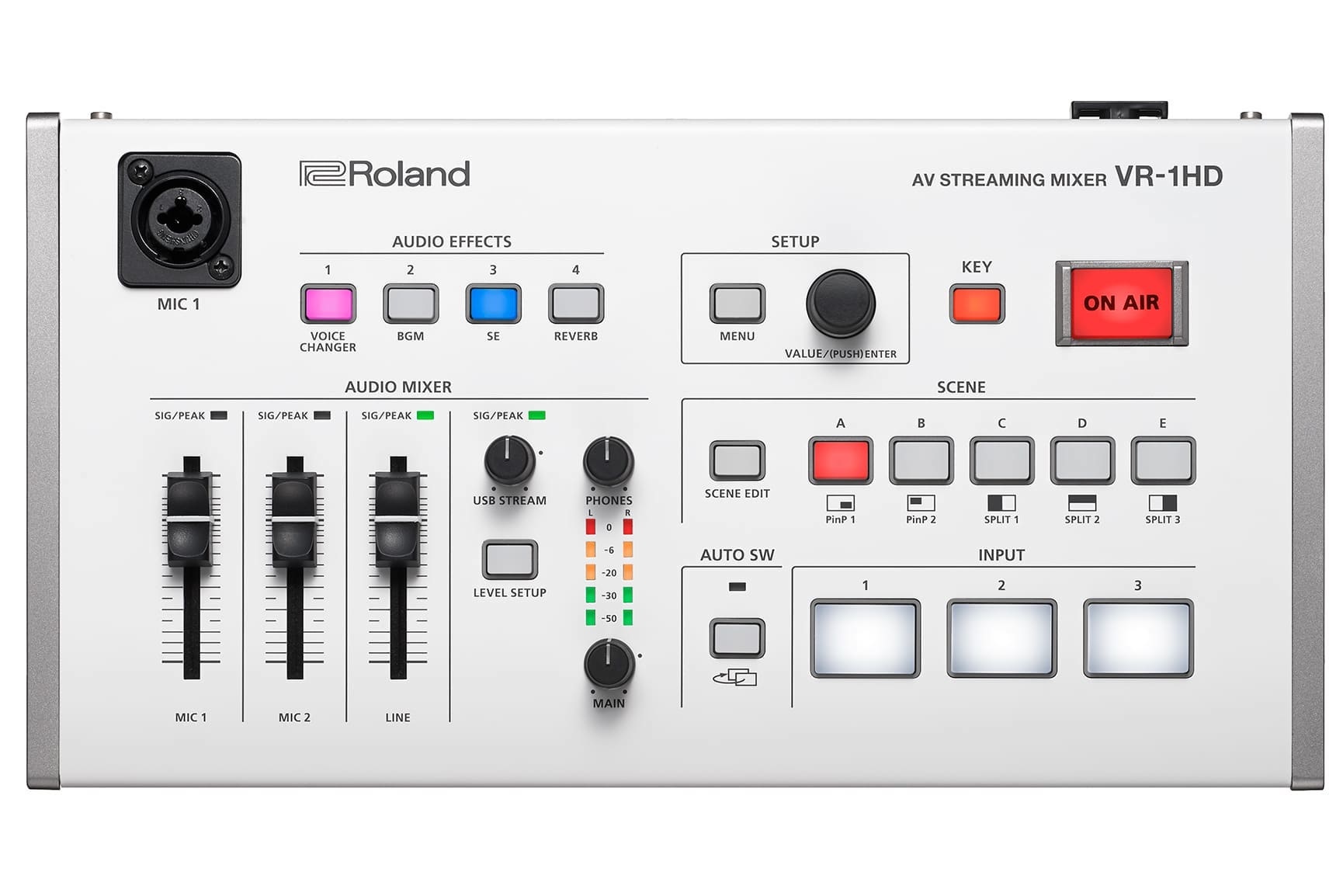ROLAND - VR-1HD - AV Streaming Mixer with USB2.0/3.0 Streaming Output
VR-1HDAV STREAMING MIXER
Real engagement in real time
If you’re a content creator seeking maximum engagement, livestreaming outperforms uploaded video by a significant margin; audiences are larger, watch for longer and post more comments. Roland’s VR-1HD lets you broadcast dynamic multi-camera livestreams, complete with amazing picture and sound that easily outshines ‘standard’ livestreams from a mobile phone or static webcam. Whether you’re a creator, gamer, commentator or presenter, it’s the easy way to livestream with high production standards. And since you’re going to get more comments, ensure they’re good ones with the VR-1HD.
System Program Ver. 1.20
Improve live streaming creative capabilities, the VR-1HD ver. 1.20 update includes Chroma Key visual effects for background replacement, motion scene switching for fluid transitions between complex scenes, and a unique Picture by Picture layout to show two video sources side by side.
Your ‘plug and play’ broadcast studio
The VR-1HD has three “worry-free” HDMI inputs, and each one accepts a variety of HD and computer-based video resolutions. This lets you connect, switch and stream different sources including cameras, presentations, gameplay and even smartphones and tablets without having to think about it. The audio from these sources can be blended with the two studio-quality XLR microphone inputs and dedicated line input. Best of all, as the VR-1HD is designed for live broadcasting, its dedicated controls and top-mounted mic input (with gooseneck mic) let you go hands-free and headset-free while livestreaming.
Switch to superior livestreams
When preparing a video for uploading, your editing software can add some impressive layering options, including professional transitions that make ‘live-switched’ videos look boring by comparison. The VR-1HD has built-in Scene Switching to instantly jump between scenes that contain preset arrangements of layered sources, displayed within customizable inset windows.
Set-up the scenes in advance and recall them via the five scene preset buttons, to make your livestreaming way more interesting.
Stand out from the crowd
Chroma keying and green screens place a subject in front of a background that isn't really there and is a high-end visual effect found in movies and used by weather people. Stand out from the crowd of live streamers to broadcast live from the beach or another planet or use chroma key technology to teach and promote your products all from the comfort of your home.
Video director inside
When you’re presenting a livestreamed vlog or nailing a live music performance, you’d normally need another person to help switch cameras. The VR-1HD lets you go it alone with three Auto Switching modes that take the strain once the broadcast begins;
Video Follows Audio
The VR-1HD switches cameras based on who’s speaking into their microphone. If both people talk at once, or if no one is speaking, the VR-1HD can switch to a wide shot showing both presenters.
Beat Sync Switching
Start playing music and the VR-1HD will switch to different camera inputs based on your playing tempo or the music in your DJ performance – letting you act as your own VJ.
Auto Scan
For extended live streams with no operator, set the VR-1HD to switch between sources in a pre-defined order, or randomly, at your chosen rate of time.
Audio engineer inside too
Put audio on auto-pilot and relax, thanks to the VR-1HD’s Auto Mixing function. Just like having a sound engineer, you can ensure that different audio inputs aren’t competing, while also checking that the sound remains balanced. You can even set certain inputs to take priority so when the host starts to speak, the other audio levels are automatically reduced. Audio from your input sources can automatically change when you switch video sources, by engaging the Audio Follows Video function – one less thing to worry about during your livestream.
Sound like your best self or not yourself
Nobody talks about good sound when watching a live stream but they sure notice when its bad. Pros use sound “equalizers” to balance the highs and lows of the audio, “gates” to keep open mics quiet unless someone is speaking and “compressors” to balance out changes in volume when speaking or singing. These are all in the VR-1HD to make sure everyone sounds their best on air along with reverb if someone is inspired to sing and needs a little ambience.
Radically transform your voice
Roland makes the legendary VT series of Voice Transformers, used by creators, gamers and singers to radically change their voice in real-time. This technology means that a male can sound like a female, a female can sound like a male, and anyone can sound like a robot, a monster or an alien. Derived from Roland’s VT series, the VR-1HD’s Voice Changer effect can be applied to the mic inputs, and each input even has its own Voice Changer settings, so people can sound like someone else — or something else — entirely.
Sounds and stingers on-demand
Some of the greatest radio and video personalities incorporate a signature soundtrack and sound effects, known as stingers, that become part of their brand and image. The VR-1HD lets you add your own custom sound effects via USB memory, including jingles or even a theme song, and trigger them instantly via the four Audio Effects buttons on the VR-1HD’s top panel.
Connect to your computer, connect to your audience
The VR-1HD uses the same connection technology as webcams, so just hook up to your computer via USB 3.0 and fire up the live casting or recording software. Then jump straight into a professionally produced, Full HD broadcast on your favorite platform, including Twitch, YouTube or Facebook Live.
RCS
The VR-1HD RCS software is designed to control the VR-1HD using a computer. By connecting the VR-1HD to your computer via USB, you will be able to copy settings (backup) or update the system software of the VR-1HD in addition to remote controlling the unit from your computer
VIDEO
Video Processing
4:4:4 (Y/Pb/Pr), 10-bit
Input Connectors
VIDEO INPUT 1--3 connectors: HDMI type A x 3
* HDCP Supported.
* Multi-format Supported
Output Connectors
MAIN connector: HDMI type A
* HDCP Supported
MONITOR connector: HDMI type A
* HDCP Supported
THRU connector: HDMI type A
* HDCP Supported
USB STREAM port: USB B type
Input formats
480/59.94i, 576/50i, 480/59.94p, 576/50p, 720/59.94p, 720/50p, 1080/59.94i, 1080/50i, 1080/59.94p, 1080/50p, VGA (640 x 480/60 Hz), SVGA (800 x 600/60 Hz), XGA (1024 x 768/60 Hz), HD (1280 x 720/60 Hz), WXGA (1280 x 800/60 Hz), SXGA (1280 x 1024/60 Hz), FWXGA (1366 x 768/ 60 Hz), SXGA+ (1400 x 1050/60 Hz), UXGA (1600 x 1200/60 Hz), FHD (1920 x 1080/60 Hz), WUXGA (1920 x 1200/60 Hz)
* The refresh rate is the maximum value of each resolution.
* Conforms to VESA DMT Version 1.0 Revision 11.
* 1920 x 1200, 60 Hz: Reduced blanking
* The video signal frame rate can be selected at the SYSTEM menu (59.94 Hz or 50 Hz).
Output formats
MAIN, MONITOR connectors:
720/59.94p, 720/50p, 1080/59.94i, 1080/50i, 1080/59.94p, 1080/50p, XGA (1024 x 768/60 Hz) (*1), WXGA (1280 x 800/60 Hz) (*1), SXGA (1280 x 1024/60 Hz) (*1), FWXGA (1366 x 768/60 Hz) (*1), SXGA+ (1400 x 1050/60 Hz) (*1), UXGA (1600 x 1200/60 Hz), FHD (1920 x 1080/60 Hz), WUXGA (1920 x 1200/60 Hz)
* The video signal frame rate can be selected at the SYSYTEM menu (59.94 or 50).
(*1) Output refresh rate is 75 Hz when frame rate is set to 50 Hz.
USB STREAM port:
854 x 480/29.97p, 854 x 480/25p, 854 x 480/59.94p, 854 x 480/50p, 720/29.97p, 720/25p, 720/59.94p, 720/50p, 1080/29.97p, 1080/25p
* The video signal frame rate can be selected at the SYSTEM menu (59.94 Hz or 50 Hz).
Still Image
Maximum Size: 1920 x 1200 pixels
Format: Windows Bitmap File (.bmp) 24 bit per pixel, uncompressed
* It can be loaded up to 2 files from USB memory at startup.
Video Effects
Scene: PinP, Split, PbyP
Transition: Black fade, Mix fade, Motion
Key Composition: Luminance key, Chroma key
Other: Still Image playback, Output fade (Audio, Video: WHITE or BLACK), Test pattern output
AUDIO
Audio Processing
Sample rate: 48 kHz, 24 bits
Audio formats
VIDEO INPUT 1--3 connectors: Linear PCM, 48 kHz, 24 bits, stereo
USB STREAM port: Linear PCM, 48 kHz, 16 bits, stereo
Input Connectors
VIDEO INPUT 1--3 connectors: HDMI type A
MIC IN 1--2 jacks: Combo type (XLR, 1/4-inch TRS phone), phantom power (DC 48 V, 10 mA Max)
LINE IN jacks: RCA phono type
USB STREAM port: USB B type
Output Connectors
MAIN connector: HDMI type A
MONITOR connector: HDMI type A
LINE OUT jacks: RCA phono type
USB STREAM port: USB B type
PHONES jack: Stereo miniature phone type
Nominal Input Level
MIC IN 1--2 jacks: -60--+10 dBu (Maximum input level: +28 dBu)
LINE IN jacks: -10 dBu (Maximum input level: +8 dBu)
Input Impedance
MIC IN 1--2 jacks: Minimum 10 k ohms (balanced, HEAD AMP GAIN: 0--+17 dBu), Minimum 5 k ohms (balanced, HEAD AMP GAIN: +18--+64 dBu)
LINE IN jacks: 15 k ohms
Nominal Output Level
LINE OUT jacks: -10 dBu (Maximum input level: +8 dBu)
PHONES jack: 92 mW + 92 mW (32 ohms)
Output Impedance
LINE OUT jacks: 1 k ohms
PHONES jack: 10 ohms
Audio Effects
Auto mixing, Echo canceller, Howling canceller, EQ, Delay, Compressor, HPF, Gate, Reverb, Limiter, Voice changer
Audio Player
Number of Players: 4
Data Format: WAV (Linear PCM, 48 kHz, 16 bits stereo/44.1 kHz, 16 bits, stereo)
COMMON SECTION
Connectors
USB MEMORY port (HOST): USB A type (For USB flash drive, Still image, Audio player)
USB STREAM port (DEVICE): USB B type (For USB-VIDEO (USB 3.0), USB-AUDIO (USB2.0): stereo 1 IN/1 OUT, Remote control)
DC IN jack
Functions
Scene memory : 5
Panel lock function
EDID emulator
Auto switching (Auto scan, Beat sync switching, Video follow audio)
Power Supply
AC Adaptor
Current Draw
2 A
Power Consumption
24 W
Operation Temperature
+0 to +40 degrees Celsius
+32 to +104 degrees Fahrenheit
Dimensions
314 (W) x 169 (D) x 66 (H) mm
12-3/8 (W) x 6-11/16 (D) x 2-5/8 (H) inches
Weight
1.6 kg
3 lbs 9 oz
Accessories
Startup Guide
Leaflet “USING THE UNIT SAFELY”
AC adaptor
Power cord


















